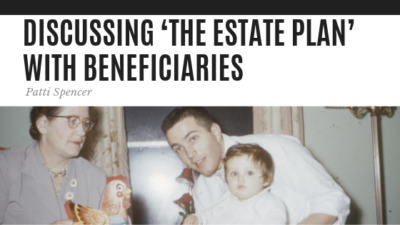Discussing ‘The Estate Plan’ with Beneficiaries

Estate planning aims at the transfer of wealth from one generation to another in a way which minimizes taxes and maximizes economic gain. It usually involves parents making gifts to their children, grandchildren, or charities. The problem is that while many clients spend hours with attorneys, accountants, and financial advisors crafting an estate plan, they spend no time with their intended beneficiaries explaining what they have done and why. After mom and dad are gone, the family acrimony begins – brother sues brother and sisters stop talking to one another for years.
Since your typical (dysfunctional) family has trouble communicating about day-to-day activities such as what to have for dinner, perhaps it is no surprise that the typical family cannot and does not communicate about dying, property division, and settling estates. Nevertheless, communicating the plan and addressing the issues before death is the best gift you can give your beneficiaries.
It is not bad manners to talk about the estate plan, and it will not make matters worse. What makes matters worse is leaving the children to fight it out after mom and dad are both gone. If you are afraid to tell your kids what your estate plan is, you are leaving them a legacy of acrimony. Talking about the plan and discussing it can ensure that hidden agendas are brought out into the open, get the most buy-in from the parties, and get the best protection against the plan being contested.
A good estate planning attorney can help with this process if the clients are willing. The attorney does not do family therapy, but rather aims to resolve disputes while attempting to preserve family relationships. It depends on opening lines of communication and coming up with solutions.
Open communication is also good for planning and discussing long-term care issues with parents, to determine how siblings can share equitably the responsibility of helping aging parents, and how to deal with caregivers and medical personnel.
Much is at risk in estate planning, and the most important is not estate and inheritance taxes. The most important factors are the beneficiaries, their lives and their relationships – in other words, the family.
